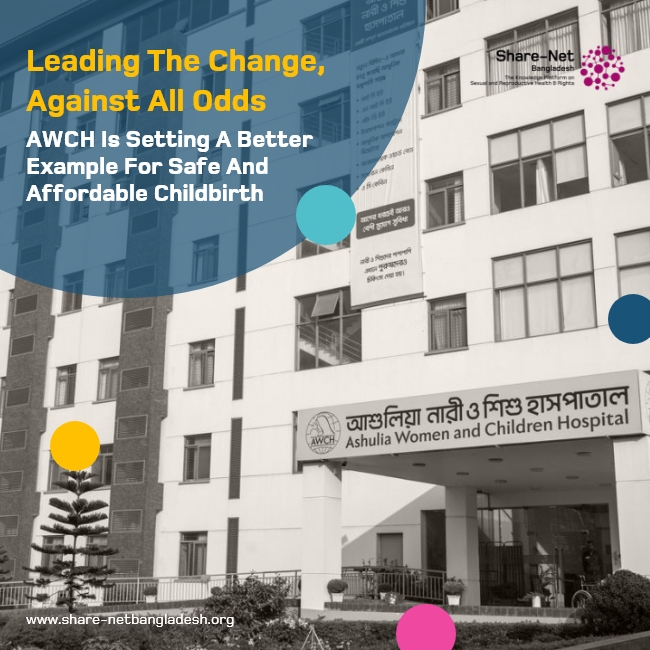Leading The Change, Against All Odds: AWCH Is Setting A Better Example For Safe And Affordable Childbirth
“From 68% to 36% between 2016 and 2023” – this significant drop in caesarean section (C-section) rates at the Ashulia Women and Children Hospital (AWCH) highlights a remarkable achievement in promoting safe childbirth in Bangladesh.
At a time when C-sections have become alarmingly common, AWCH stands out by prioritizing normal deliveries and ensuring the well-being of both mothers and babies. Located in Beron, Ashulia, this fully philanthropic non-profit hospital is making a profound impact on sexual and reproductive health rights (SRHR) and safe childbirth.
In Bangladesh, the rise in C-sections is concerning, with private hospitals performing between 75% and 80% of deliveries through this method as of 2022. In contrast, AWCH has reduced its C-section rates to 36%, thanks to its dedicated 24/7 team of medical professionals and the implementation of Robson’s Classification system. This achievement aligns with Sustainable Development Goals (SDGs), particularly those related to maternal health and well-being.
AWCH’s commitment to SRHR is evident in its support for vaginal birth after caesarean section (VBAC), offering mothers an alternative to repeat C-sections. This approach not only promotes safe childbirth but also enhances the overall reproductive health of women. The hospital’s focus on normal deliveries builds confidence among patients, drawing individuals from remote regions like Bogura, Mymensingh, and Panchagarh.
The hospital’s efforts have not gone unnoticed. The Bill & Melinda Gates Foundation has recognized AWCH for its exemplary treatment of the underprivileged community, enabling it to secure funding aimed at training healthcare professionals and reducing unnecessary C-sections. This recognition places AWCH among only seven hospitals worldwide to receive such esteemed support, underscoring its leadership in maternal health.
AWCH extends its services beyond childbirth, functioning like a general hospital. Since its inception in 2004, the hospital has prioritized high-quality healthcare for garment workers and impoverished communities in the Savar industrial area. Approximately 78% of AWCH’s patients come from low-income backgrounds, yet the hospital operates on the principle of not denying treatment due to financial constraints. It provides financial assistance from a designated fund, ensuring that healthcare remains accessible.
The hospital’s Outpatient Department (OPD) operates from 8 am to 8 pm, including Fridays, and its vaccination center is open year-round, administering 150 to 200 vaccinations daily. AWCH’s fees are significantly lower compared to other facilities in Dhaka, with consultation fees ranging from Tk250 to Tk500 and ward bed rents at Tk500. These affordable rates make healthcare accessible to all, aligning with the SDGs’ aim to reduce inequality and promote well-being.
AWCH’s impact extends to critical cases, exemplified by the successful treatment of a young dengue patient who received top-notch ICU care despite the family’s financial constraints. This compassionate approach highlights the hospital’s dedication to patient-centered care and community engagement.
Founded through Shanta Holdings Limited’s philanthropic initiative, AWCH is transitioning towards a self-sustaining model. While Shanta Holdings Limited continues to fund capital expenses, the hospital aims to cover operating costs through revenue generation. Dr. Dabir Ahmed, AWCH’s Chief Executive Officer, emphasizes the importance of community engagement to ensure financial sustainability, acknowledging the challenge of serving a primarily low-income patient population.
AWCH’s dedication to promoting safe childbirth and providing compassionate healthcare sets a high standard for women’s and children’s health in Bangladesh. By reducing unnecessary C-sections, and ensuring reproductive healthcare for underprivileged people, AWCH is not only improving healthcare but also paving the way for a healthier, more equitable future.
Source: The Business Standard
Picture Credit: The Business Standard

